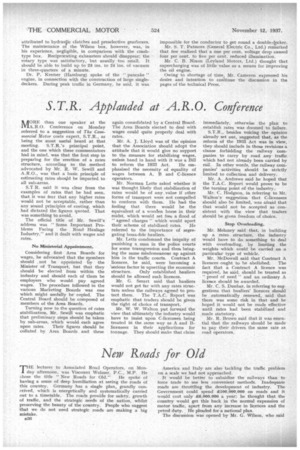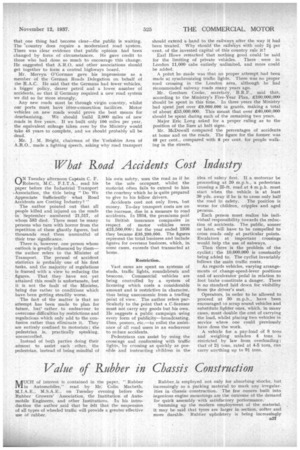New Roads for Old
Page 20

Page 21

If you've noticed an error in this article please click here to report it so we can fix it.
THE lecturer to Associated Road Operators, on Monday afternoon, was Viscount Wolmer, P.C., M.P. He chose the title " New Roads for Old." He spoke of having a sense of deep humiliation at seeing the roads of this country. Germany has a single plan,, grandly conceived, which is energetically and systematically carried out to a timetable. The roads provide for safety, growth of traffic, and the strategic needs of the nation, whilst preserving the beauty of the country. People who suggest that we do not need strategic roads are making a big mistake.
836 America and Italy are also tackling the traffic problem on a scale we had not approached.
It would be better to subsidize the railways than to force trade to use less convenient methods. Inadequate roads are throttling the development of industry. The Government could spend 2100,000,409 on roads and it would cost only £6,000,000 a year; he thought that the country would get this back in the normal expansion of motor traffic, apart from any increase in licences and the petrol duty. He pleaded for a national plan.
The discussion was opened by Mr. G. Wilson, who said
that one thing had become clear—the public is waiting. The 'country does require a modernized road system. There was clear evidence that public opinion had been changed by force of circumstances. He gave credit to those who had done BO much to encourage this change. He suggested that A.R.O. and other associations should get together to form a central highways board.
Mr. Mervyn O'Gorman gave his impressions as a member of the German Roads Delegation on behalf of the R.A.C. He said that the Germans had fewer vehicles, a bigger policy, dearer petrol and a lower number of accidents, so that if Germany required a new road system we did so far more strongly.
Any new roads must be through virgin country, whilst our ports must have inter-connection facilities. Motor vehicles on new roads would prove the best means for deurba,nizing. We should build 2,000 miles of new roads in five years.. If we built only 100 miles per year, the equivalent mileage taken over by the Ministry would take 45 years to complete, and we should probably, .all be dead.
Mr. J. m. Bright, chairman of the Yorkshire Area of A.R.O., made a fighting speech, asking why road transport
should extend a hand to the railways after the way it had been treated. Why should the railways With only 2i per icent, of the invested capital of this country rule it?
Earl Howe remarked that nothing good could•be said for the limiting of private vehicles. There were in London 11,000 cabs entirely unlimited, and more could be added.
A point he made was that no proper attempt had been made at synchronizing traffic lights. There was no proper road crossing in the London area, although he had recommended subway roads many years ago.
Mr. Gresham Cooke, secretary, B.R.F., said that, according to the Ministry's Five-Year Plan, £100,000,000 should be spent in this time. In three years the Ministry had spent just over £9,000,000 in grants, making a total of about E15,000,000. This meant that over £40,000,000 should be spent during each of the remaining two years.
Major Eric Long asked for a proper ruling as to the position of the lines at halt signs.
Mr. McDowall compared the percentages of accidents at home and on the roads. The figure for the former was 48 per cent., compared with 8 per cent. for people walking in the streets.








































